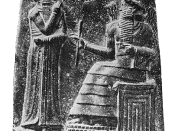Although Hammurabi was probably strong enough to maintain rule through the might of the sword, he provided a set of laws bringing justice and stability to a chaotic and violent region. His laws had the following sections: the prologue, the administration of justice, property, irrigation, loans and interest, regulation of trade, debt slavery, marriage and the family, adoption, personal injury and manslaughter, physician's fees and malpractice, building regulations, wage regulations, and an epilogue. Each line within each section covers something important to the operations of Babylonian society. Although some of Hammurabi's ideas appear harsh, they probably brought stability to this society. The alternative was chaos and war.
The most important section of this code is probably the prologue. It shows that these laws do not come from one man. Hammurabi makes it clear that he is the king and wants order and stability in the land. Disobeying the laws means not only violating the wishes of the king, but also angering the gods.
The threat of death appears frequently in these sections. False witness, fraud, and robbery are all ways in which could result in execution of the offender. The simple act of allowing unwanted people to stand within the seller's establishment could prove fatal. However, it is not easy to bring order to a world that has seen little of it ever.
Babylon had been settled for centuries, giving its residents time to become concerned over property. Not only is there a specific section devoted to property, but also these concerns appear throughout the code. Property is a major factor in marriages, and concern must be placed on who owns what, especially when the husband pays attention to women other than his wife. The wife has a dowry and sometimes children. The concubine may also produce children competing...



"Code of Hammurabi"
It was overall a good essay, but you should have stated who the 'he' Hammurabi was.
2 out of 2 people found this comment useful.